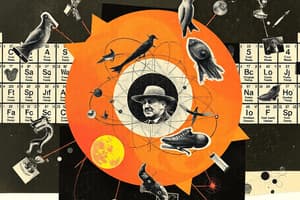Podcast
Questions and Answers
What is matter?
What is matter?
Anything that occupies space and has mass.
Define mass.
Define mass.
The amount of matter in an object.
What is weight?
What is weight?
The gravitational force acting on an object of a given mass.
What are the three major types of subatomic particles?
What are the three major types of subatomic particles?
The atomic number of an element is equal to the number of ______ in the atoms of that element.
The atomic number of an element is equal to the number of ______ in the atoms of that element.
The number of protons and the number of electrons in each atom are ______.
The number of protons and the number of electrons in each atom are ______.
Electrons have a positive charge.
Electrons have a positive charge.
Most of the volume of an atom is occupied by the nucleus.
Most of the volume of an atom is occupied by the nucleus.
Which of the following elements are part of the majority of the body's weight? (Select all that apply)
Which of the following elements are part of the majority of the body's weight? (Select all that apply)
What defines an element?
What defines an element?
Flashcards
Matter
Matter
Anything that occupies space and has mass.
Mass
Mass
The quantity of matter in an object, measured in kilograms (kg).
Weight
Weight
The force exerted on an object due to gravity.
Neutron
Neutron
Signup and view all the flashcards
Proton
Proton
Signup and view all the flashcards
Electron
Electron
Signup and view all the flashcards
Atomic Nucleus
Atomic Nucleus
Signup and view all the flashcards
Element
Element
Signup and view all the flashcards
Atomic Number
Atomic Number
Signup and view all the flashcards
Mass Number
Mass Number
Signup and view all the flashcards
Study Notes
Atomic Structure and Basic Chemistry
- Matter is anything that occupies space and has mass, while mass is the amount of matter in an object, measured in kilograms (kg).
- Weight is the gravitational force acting on an object’s mass, exemplified by how gravity affects an apple.
Characteristics of Atoms
- Atoms consist of subatomic particles: neutrons (no charge), protons (one positive charge), and electrons (one negative charge).
- Protons and neutrons form the nucleus of an atom, accounting for 99.97% of its mass, while electrons orbit around the nucleus, contributing to the atom's volume.
- Atoms are electrically neutral because the number of protons equals the number of electrons, canceling their charges.
Elements and Their Importance
- An element is the simplest form of matter with unique chemical properties, composed of a single type of atom.
- About 96% of the body’s weight comes from four elements: oxygen, carbon, hydrogen, and nitrogen, with oxygen being the most abundant element in both the body and Earth's crust.
Atomic Number and Mass Number
- The atomic number uniquely defines an element, representing the number of protons in its atoms; it is identical to the number of electrons.
- The mass number refers to the total number of protons and neutrons in an atom, providing insight into its isotopes.
Isotopes and Atomic Mass
- Isotopes are variants of elements with the same number of protons but different numbers of neutrons, resulting in differing mass numbers.
- Atomic mass is a weighted average of the masses of all isotopes of an element.
Mole and Molar Mass
- A mole is a unit that quantifies substances; it is equivalent to 6.022 x 10²³ particles of that substance.
- Molar mass is the mass of one mole of a substance, helping in converting between grams and moles for chemical calculations.
Molecules and Compounds
- Molecules are formed when two or more atoms bond chemically, while compounds consist of different types of atoms bonded together.
- Intermolecular forces govern the interactions between molecules, affecting their physical properties.
Solubility and Dissociation
- Solubility is the ability of a substance to dissolve in a solvent, which is critical for biological processes.
- Dissociation refers to the separation of molecules into smaller particles, often ions, in solution, influencing chemical reactions in biological systems.
Studying That Suits You
Use AI to generate personalized quizzes and flashcards to suit your learning preferences.




